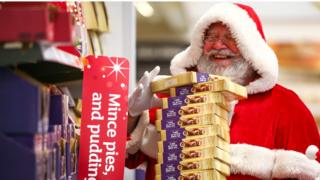Sainsbury’s sees retail sales fall 1.1% over Christmas
 Image copyright
Image copyright
Sainsbury’s
Sainsbury’s has seen sales fall over Christmas after general merchandise trading was hit by consumer caution.
Like-for-like retail sales, which exclude sales from new stores, fell by 1.1% across the Christmas period.
General merchandise sales, including at Sainsbury’s-owned Argos, fell by 2.3% and overall clothing sales by 0.2%.
Chief executive Mike Coupe said: “Retail markets are highly competitive and very promotional and the consumer outlook continues to be uncertain.”
He added: “General merchandise sales grew strongly over the key Christmas weeks and outperformed the market over the quarter.
“Sales declined in the quarter due to cautious customer spending and our decision to reduce promotional activity across Black Friday. Clothing performed well, with strong full-price sales growth in a tough market.”
However, the supermarket giant said in the 15 weeks to 9 January, grocery sales grew by 0.4%, with groceries online and in convenience stores up by 6% and 3%.
Image copyright
Getty Images
Analysis by Today business presenter Dominic O’Connell
Pundits had expected Sainsbury’s to have the weakest Christmas numbers of the big four grocery chains.
They were right – but for the wrong reasons. Sainsbury’s core grocery business did quite well given the fierce competition from the mainstream rivals Tesco, Morrisons and Asda, and the extra squeeze from the German-owned discounters Aldi and Lidl.
The weakness came in so-called general merchandise, which includes Argos, which Sainsbury’s bought two years ago.
The problem, Sainsbury’s said, was not Christmas trading, but Black Friday.
It chose not to follow rivals’ fierce discounting and sales suffered accordingly.
While this explanation is undoubtedly correct, it will not impress investors, who will point out that Argos was meant to provide diversification away from the super-competitive grocery market, and that complaining about discounting on Black Friday is like complaining about cold weather in January.
All this week’s trading updates show only sales. We will not know the real winners – which retailers turned those sales into profits – until later in the year, in Sainsbury’s case in the full-year results in May.
The third-quarter retail sales figure was worse than analysts had expected, having predicted a 0.2% decline.
Retail analyst Teresa Wickham told BBC Radio 4’s Today programme: “It is a mixed bag. Christmas has clearly been difficult for them.”
She said Sainsbury’s had had to make difficult decisions about how far it should go down the promotional route in order to compete with Aldi and Lidl.
But she added that the UK’s second-largest grocery chain had a “very valuable property in Argos”, despite the fall in merchandise sales.
And Richard Lim, chief executive at Retail Economics said: “These results aren’t disastrous but demonstrate the significant challenges faced by the big grocers.
“Fiercer competition from the discounters, massive price investment from key competitors and shifting shopper behaviour have created a pressurised trading environment. Market share continues to slip away to the German discounters.
“The decline in non-food reflects the wider slowdown in consumer confidence as cautiousness shown towards discretionary spending. Hard-fought sales in a heavily-discounted environment will put profitability under further pressure.”
Sainsbury’s plans to merge with rival Asda, with the Competition Market Authority’s verdict on the plan expected to be published in February.

